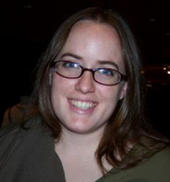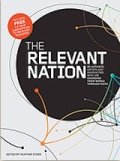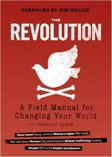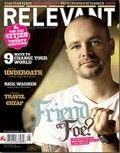 Heather Zydek is a writer, editor & musican. She has edited two fantastic books, both of which have been reviewed on this site & has been the editor of the Revolution section of Relevant Magazine. In the correspondance I have had with her, she has been gracious & very amiable. She is a mother & still finds time to help change the world.
Heather Zydek is a writer, editor & musican. She has edited two fantastic books, both of which have been reviewed on this site & has been the editor of the Revolution section of Relevant Magazine. In the correspondance I have had with her, she has been gracious & very amiable. She is a mother & still finds time to help change the world.What is your background & what led you to write?
My background is pretty ordinary. I was raised in the northwest suburbs of Chicago, in a very white, very affluent area. I wasn’t exposed to a whole lot of culture growing up (unless you count pop culture by way of television), so when I got to college I was like a kid in a candy shop – I loved being exposed to new ideas and new ways to contribute to the world.
I started writing as a pre-teen, in middle school. I enjoyed writing short stories and journaling in sixth grade, and in seventh grade I wrote a story for the Young Author’s contest and won first place. In high school I wrote a lot of really bad pseudo-beatnik poetry. In college I wrote for the student-run daily newspaper and was fairly involved with the ‘zine scene – I even started a ‘zine library at one point in an underground coffee house some friends and I co-founded (it’s now defunct). In graduate school I started doing freelance work for small publications, from local alt-weeklies to small but nationally distributed magazines. Now I’m hoping to focus more exclusively on writing novels targeted at tweens. I’ll probably continue writing and editing articles on the side. Oh, and did I mention I’m a mother? I have three young kids – that certainly keeps me busy enough, but somehow I manage to find time to write.
 For your two major projects, The Revolution & The Relevant Nation, did you develop the concept for them, or were you asked to pull them together?
For your two major projects, The Revolution & The Relevant Nation, did you develop the concept for them, or were you asked to pull them together?Actually, the folks at Relevant Books initially conceived both ideas and then approached me about editing them. I had just become the editor of Relevant’s online Revolution section and a couple months into my work I was asked to edit The Revolution. They later asked me to edit The Relevant Nation after finishing The Revolution manuscript. At first The Relevant Nation was intended to be a sort of follow up to The Revolution; it was going to be called “Revolutionaries” until we found out that George Barna was working on a similar follow up to *his* Revolution, also called “Revolutionaries.” So we changed the name to The Relevant Nation, which, in the end, seemed more fitting anyway.
What authors have influenced your writing &/or your spiritual life?
Of course I’d have to say C.S. Lewis (my favorite is The Screwtape Letters), but beyond that, I’d say Frederica Mathewes-Green has been a big inspiration – I love the wisdom in her work and her down-to-earth writing voice. I’m also partial to lives of the saints, particularly those recorded in St. Nikolai Velimirovic’s “Prologue from the Ochrid.” The books of the Bible that have influenced me most are the Gospels, Ecclesiastes, and the book of James. And I’m finding that I really enjoy reading fiction, perhaps more than anything else. Right now I’m reading Deliverance by James Dickey. I’ve also been reading some short stories by Flannery O’Connor.
 You mention in The Revolution that “we’re quick to respond, but also quick to forget.” How can people not forget?
You mention in The Revolution that “we’re quick to respond, but also quick to forget.” How can people not forget?That’s a great question, and it’s something I’ve been agonizing over lately. One of my biggest worries is that following the big ONE Campaign craze last year that made social justice so fashionable, the trendiness of crusading for human rights is inevitably going to diminish in time. So I’ve been trying to think of ways to revive people’s interest in this subject. I think it’s easy for people to put social ills out of their minds when there isn’t a big international catastrophe to draw it into the public eye, and/or a crew of well-groomed celebrity spokespeople donning hip awareness-raising bracelets and t-shirts and preaching about human rights. But what is the answer? I wish I could tell you that there is an answer to keeping social justice relevant. However, I think in reality true justice isn’t something that can ever be popular for long, just as true Christianity can’t ever be made “cool” to the masses – not, at least, without seriously damaging or trivializing it in some way. I think it ultimately just takes hard work to keep the memory of injustice alive in one’s mind and a strong commitment to always doing something – even a little something – every day to help those in need.
What’s the greatest thing you’ve learned while working on a project?
I think one of the most amazing lessons I learned came from my work with The Revolution. It involved the importance of trusting God to get things done. I’m very pragmatic and self-reliant, and when I take on a project I dive into it head first, believing if I put in enough blood, sweat and tears I can control the outcome of the thing. When I first started trying to contact people whom I hoped would contribute to the book, I only got rejections. The deadline I was working under was pretty tight, so after a week or two with maybe only one person committed to contributing an essay, I started to panic. On a Friday afternoon during that time, I was working on the book and then had to take a break to nurse my baby. While I nursed her, I said a prayer in earnest. “God, I can’t do this without you. Please help me find at least one more person by the end of the day to commit to writing an essay for this book. I know you can do this for me, Lord. I believe.” Within minutes, the phone rang. Father Demetri Kantzavelos was returning my call about contributing an essay to the book on capital punishment, which he agreed to do. By the end of that day I had at least four more confirmations from other authors who had agreed to participate. By the following Monday I had not only found ten writers to contribute essays, but two more topics I hadn’t originally intended to include were added to the project and I was able to find writers to cover the subjects that same week. Although I am of weak faith, the Lord is Good.
 What draws you to write for Relevant Magazine & publish with Relevant Books?
What draws you to write for Relevant Magazine & publish with Relevant Books?Come on – who wouldn’t want to be involved with Relevant?! :) They’re doing something underground Christian zinesters had been trying to do for years before Relevant came around and finally had the resources to pull it off. I continue to be impressed with their vision and creativity and the unique way that they’re speaking to this generation.
A couple of months ago you asked in one of your editorials on relevantmagazine.com whether lavishly spending money on pets (or hobbies) was justified while poor of the world starve to death. What kind of responses did you receive?
I think almost everyone who wrote said similar things. The gist was that it’s OK to spend money on pets – we should be good stewards all creation, including our pets, and care for them properly – but that we shouldn’t go overboard, nor should we neglect our duty to serve humans in need while we care for our animals.
What do you see as a crucial topic facing the evangelical church at large today?
This is where my Orthodox Christian bias is going to come out. I think that most of modern Christians are a little overly obsessed with blending the comforts and joys of modern culture with the faith, making most expressions of evangelical Christianity too watered-down, too easy and, frankly, incredibly dull. For several years I thought my faith was doomed until I discovered the ancient ways of Eastern Orthodoxy. I’m amazed that Orthodoxy provides what appears to be the only true gateway to the early church, a gateway that most sincere Christians of today long for but fail to recognize still exists. I’m my mind, the ideal earthly church is one that combines ancient worship and theology with the kind of communal ethos of the early Christians, where great emphasis is placed on caring for fellow believers as well as for non-Christian neighbors, the sick and in need, and even one’s enemies.
 You seem to be quite interested in social justice. Can you tell me what brought that to your attention & specifically is there a cause within The Revolution which strikes a chord with you more than the others?
You seem to be quite interested in social justice. Can you tell me what brought that to your attention & specifically is there a cause within The Revolution which strikes a chord with you more than the others?I have always been interested in social justice. I remember being very upset from an early age about segregation and discrimination against African Americans. I was so inspired by Martin Luther King, Jr. that one year I even held a private memorial to him in my bedroom with my stuffed animals.
My mom always emphasized the idea of justice and equality between all human beings. Unfortunately, though, it was mostly talk. It’s not like I grew up in the kind of household where we served in soup kitchens on a weekly basis. My parents have always been kind, hospitable and compassionate, but as a whole we weren’t people of action. And growing up in an affluent part of Chicagoland, it was hard to find opportunities on a regular basis to serve people in my own backyard.
That said, when I started working in a restaurant kitchen in high school, I deeply connected with the Mexican migrant workers with whom I worked and wanted to understand them – why they lived so separately from the rich white people they served and why they were virtually invisible to “us.” And when I became a born again Christian and started reading the Bible in college, I realized how important the ideas of both service of the poor and denial of the self are – these passages were always so vivid and haunting to me, and I still find it remarkable how easily they are ignored by those of us who live in a society that places such an emphasis on comfort and convenience.
Talk about your upcoming project, Basil's Search for Miracles. What led you to novel writing?
I actually started working on ‘Basil’ before I started working for Relevant. Just after my first child was born over six years ago, I read the first Harry Potter book. I fell *in love* with it. It was so absolutely enthralling that it almost bothered me. Why is this book about witchcraft so enchanting, I thought, and why is it that there seems to be nothing out there for Christian youth on this level, something with strong Christian elements that excites children in this way? Of course, I was naive back then, and I had never read the Chronicles of Narnia. So I thought I’d try my hand at writing a novel that would approach the subject of spirituality in a down-to-earth and lively way.
My book isn’t on the level of Harry Potter or the Chronicles. It’s not even fantasy. I tell people it’s like Judy Blume realism with a splash of Orthodox mystery. The book is about a 12-year-old boy who transfers from a public school to a very highly ranked private parochial school. He dreams of being a reporter, and when he joins the newspaper staff the faculty advisor for the paper assigns him to write a column with a religious theme. Basil was raised as an agnostic, so he’s clueless as to what to write on, but decides to write about real, modern miracles. As he researches the miracles he writes about, he also befriends an abused kid at school and a mystery about the boy unfolds that culminates in a final “miracle” involving the boy and his family. The book should be released in very early 2007 by a small Orthodox Christian publisher called Conciliar Press. As it turns out, I so enjoyed the process of writing a novel that I am working on two more of what I call “spiritual coming of age stories” for tweens.





No comments:
Post a Comment